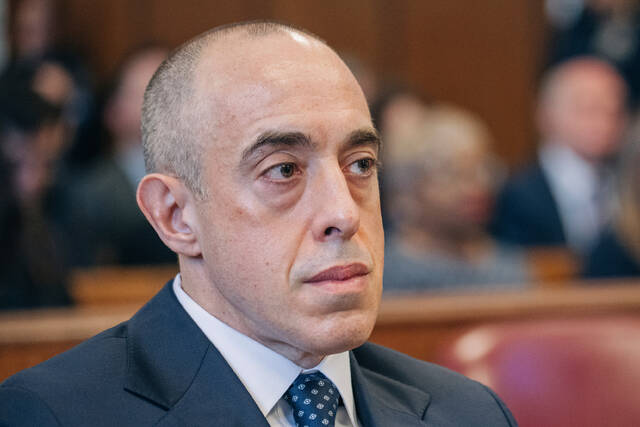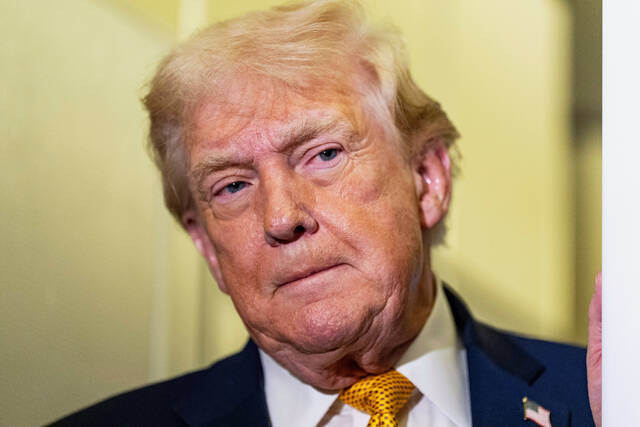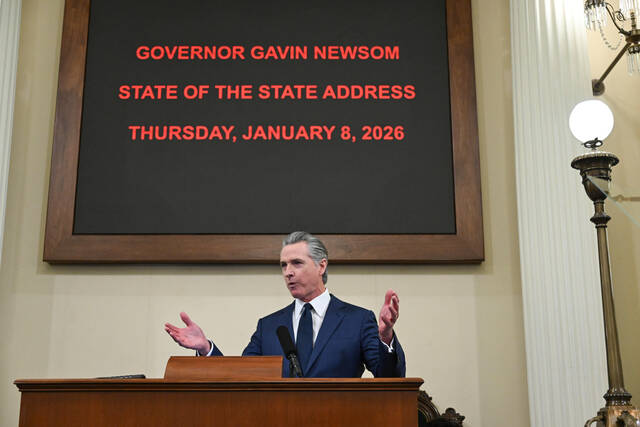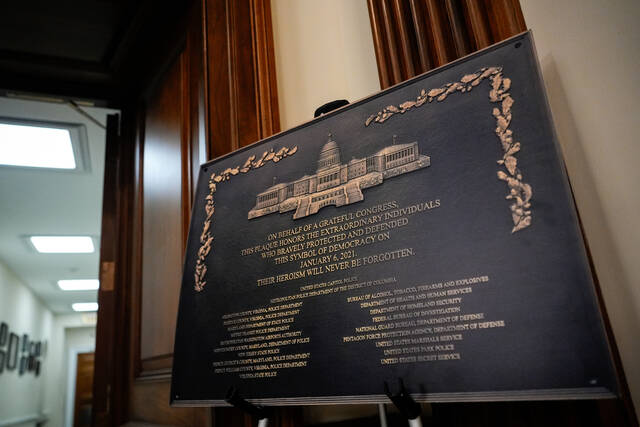The divisive nomination of Emil Bove, a zealous defender of President Donald Trump, to a lifetime seat on the federal appeals court that oversees cases in the commonwealth has generated intense reaction nationally and among former federal prosecutors and judges in Western Pennsylvania.
Trump is a big fan of his former personal lawyer, calling his judicial pick “smart and tough.” So is Bove’s boss, Deputy Attorney General Todd Blanche, another onetime Trump lawyer who described his subordinate to Fox News as a “brilliant lawyer” and the “most gentle, empathetic, great person that anybody could ever work with.”
But Bove’s nomination to the 3rd U.S. Circuit Court of Appeals, which passed out of the U.S. Senate Judiciary Committee last Thursday, is so controversial that nearly 1,000 former judges and Department of Justice attorneys signed on to separate letters last week urging senators to vote against him.
“You would think that, with that kind of opposition to a candidate for a court so important to our system, that that would be enough to stop the nomination,” said Steve Kaufman, former acting U.S. attorney for the Western District of Pennsylvania.
Opposition to Bove in Congress largely falls along party lines, while conservative legal scholars and former judges have broken ranks with the GOP to speak out against the nomination.
Kaufman, who served as a line prosecutor under seven presidential administrations, said he was not asked to sign the letter submitted by more than 900 former Justice Department lawyers to the judiciary committee Wednesday.
But he said he would have.
Instead, he emailed U.S. Sen. Dave McCormick, R-Pittsburgh, urging him to vote against the nomination.
“I think the concern is that both prosecutors and judges in our system — their duty is to the Constitution and the rule of law,” Kaufman said. “It is not to whoever appointed them or to do the bidding of that person.”
‘Henchman’ or highly qualified?
Bove, who served as Trump’s criminal defense attorney before being appointed to serve as a deputy attorney general in his new administration, has been panned for being unqualified for the position and for actions many in the justice system consider to be egregious.
“He has eagerly served as Trump’s henchman, placing Trump’s interests above the rule of law and the Constitution,” said Harry Litman, the former U.S. attorney in Pittsburgh under President Bill Clinton who hosts the podcast “Talking Feds.”
“He has been ruthless in that role, browbeating career attorneys in DOJ to violate their oaths to the court; squelching virtuous prosecutions and pushing meritless ones; exhibiting contempt for the bedrock role of the courts and the separation of powers; and misleading the Senate.”
Bove, 44, served as a federal prosecutor in the Southern District of New York for nine years. He went on to defend Trump in criminal cases brought against him by the Justice Department over classified documents taken to Mar-a-Lago after his first term ended and attempts to obstruct the election of President Joe Biden.
In his confirmation hearing statement last month, Bove rejected how he has been characterized.
“There is a wildly inaccurate caricature of me in the mainstream media,” Bove told senators. “I am not anybody’s henchman. I’m not an enforcer. I’m a lawyer from a small town who never expected to be in an arena like this.”
Early in Trump’s second administration, the president tagged Bove to become principal associate deputy attorney general, the third-highest-ranking official in the Justice Department.
In Bove’s first few months in that role, he targeted FBI agents and the line attorneys who prosecuted the cases against those who attacked the U.S. Capitol on Jan. 6, 2021.
Bove also attempted to force the interim U.S. attorney in Manhattan, Danielle Sassoon, to drop a public corruption case against New York City Mayor Eric Adams. She — and several colleagues — chose to resign rather than follow Bove’s orders.
In May, Trump nominated Bove to the 3rd Circuit, a federal appellate court with 14 judges that hears cases that originate in federal district courts in Pennsylvania, New Jersey, Delaware and the Virgin Islands.
Several of the judges who have served on that court had their origins in U.S. District Court in Pittsburgh, including Thomas M. Hardiman, D. Michael Fisher, Peter Phipps, Cindy K. Chung and D. Brooks Smith.
In nominating Bove, Trump wrote in a social media post: “Emil is SMART, TOUGH, and respected by everyone. He will end the Weaponization of Justice, restore the Rule of Law, and do anything else that is necessary to, MAKE AMERICA GREAT AGAIN. Emil Bove will never let you down!”
Gates McGavick, a Justice Department spokesman, said Bove would make an excellent judge.
“Emil Bove is a highly qualified judicial nominee who has done incredible work at the Department of Justice to help protect civil rights, dismantle Foreign Terrorist Organizations, and Make America Safe Again,” he said in a statement to TribLive.
No respect?
Bove’s nomination has prompted backlash from many of those who spent their careers in the federal justice system.
John E. Jones III, a former U.S. District judge for the Middle District of Pennsylvania in Scranton, was among those who signed the letter on behalf of 80 judges from state and federal courts across the country.
He cited as reasons Bove’s demeanor, pattern of intemperate behavior and anger.
“He does not respect the rule of law. He participated in a purge at DOJ,” Jones said.
Appointed to the federal bench by former President George W. Bush in 2002, Jones sat several times on the 3rd Circuit. He left the bench four years ago to become the president of Dickinson College in Cumberland County.
He said he has never before spoken publicly against a federal court nominee.
“It is incumbent upon those of us who support the rule of law and value the third branch that we have the best and brightest on our federal courts,” Jones said. “This nominee does not fit that.”
Among the most controversial allegations against Bove: In recent weeks, a longtime DOJ immigration lawyer who was fired by the administration came forward as a whistleblower, claiming Bove told subordinates they might need to defy court orders to protect the president’s deportation efforts.
Robert S. Cessar, a former acting U.S. attorney who spent 34 years in the Pittsburgh office, said the Senate Judiciary Committee was obligated to look carefully at the evidence of those allegations.
But, according to former U.S. District Judge Bob Cindrich, they didn’t. That, he said, is disappointing.
Cindrich, who was nominated by Clinton and served on the bench in Pittsburgh for 10 years, also signed the letter from the judges.
At first, Cindrich was reluctant, hoping the committee would do its job and give a full, public hearing on the claims against Bove.
“I had misgivings, but I concluded that we better speak or maybe never be heard,” Cindrich said.
‘Lack of courage’
Based on Thursday’s events at the Senate Judiciary Committee, Cindrich said the judges were right to pen the letter.
At the hearing, the Republican-led committee refused to allow the Democrats to express their reservations and called for a voice vote. The Democrats stormed out, and the nomination passed out of committee 12-0.
Litman called the majority’s actions “pusillanimous.”
“They knew that the allegations were strong — certainly more than strong enough to investigate — and that if substantiated, flatly disqualifying,” Litman said. “So they chose to bury their heads in the sand and pretend there was nothing to see.”
The majority in the Senate is in lockstep with the Trump administration, Cindrich said.
Jones, the former Middle District judge, said Bove’s nomination is being rammed “through in record time before somebody else surfaces” with more allegations.
“In a prior administration, this nomination — if it even happened — would have been pulled down, or it never would have gotten out of committee,” Jones said. “There is a lack of courage in the Senate. In large measure, they are afraid of Trump.”
Cindrich is especially frustrated by the lack of civility, due diligence and due process.
“It’s a failure of process,” Cindrich said.
But U.S. Sen. Chuck Grassley, R-Iowa, the judiciary committee’s chairman, spoke out against what he described as “unfair rhetoric and treatment” of Bove by some of his committee colleagues.
“Frankly, it’s crossed the line,” Grassley said this month. “Mr. Bove has a strong legal background and has served his country honorably. He deserves fair treatment.”
‘Red flares’
Paul Michel, the retired chief judge for the U.S. Court of Appeals for the Federal Circuit, also signed the letter.
Previously an assistant special Watergate prosecutor and deputy chief of the Public Integrity Section at DOJ, Michel served as chief of staff to U.S. Sen. Arlen Specter of Pennsylvania, who died in 2012.
Michel was appointed to the bench in 1987 under the Reagan administration and retired in 2010.
“Circuit judges have so much power and such a role in our country that only people with the highest morals and sound judgment are suitable candidates,” Michel said.
It’s clear to Michel there are serious questions about Bove’s judgment, ethics, character and his ability to decide cases based on the law.
“It suggests, perhaps, his highest priority is loyalty to his client — his new superior in the executive branch,” he said.
Cindrich described vetting of federal judicial nominees as intense. Any of the allegations against Bove, if proved, could be disqualifying, he said.
“There are red flares bursting in the sky all over the place that we should look at,” according to Cindrich.
The worst, Cindrich said, is the allegation Bove told his subordinates to potentially defy a court order.
“The idea an order of the judiciary would not be adhered to by the executive branch creates a constitutional crisis, and who knows where that ends?” he said.
Cindrich was particularly critical of Trump nominating his private attorney to a high-ranking position — noting this administration has done so repeatedly. He cited as an example Attorney General Pam Bondi.
That same thought was included in the judges’ letter, in which they said the nomination is inappropriate, “especially when that president has said he is nominating judges based on whether they will be more loyal to him than to the country.”
“Elevating a nominee whose record reflects a pattern of misconduct, disregard for lawful authority and political entanglement would not only compromise the integrity of the courts,” they wrote, “it would set a dangerous precedent that judicial power may be wielded in service of personal fealty rather than constitutional duty.”
‘Critical’ work
Litman has vetted dozens of federal judicial candidates for Republican and Democratic administrations.
Those reviews sometimes turn up issues that torpedo a nomination, he said, citing as an example a controversial memo in a person’s past.
“But they don’t begin to approach the gravity of Bove’s transgressions,” Litman continued. “Bove would have raised scarlet flags at every turn, beginning with the serious complaints from both defense attorneys and junior prosecutors he supervised.
“But the ultimate issues of integrity, honesty and stunning dereliction of the duty to obey courts from his last few months at the DOJ would have prevented the nomination from going forward in the first place.”
If Bove is confirmed, he will be joining a bench that has a reputation for fairness and intelligence, Cessar said.
The circuit courts — which are one step below the U.S. Supreme Court — define the law.
“It’s a very powerful role that has almost no review except in the rarest case,” Michel said. “They have to be individuals who can inspire confidence in the citizenry as well as the litigants who appear before them.”
The work the 3rd Circuit does is critical, Kaufman said.
“Because the Supreme Court takes so few cases per year, the 3rd Circuit Court of Appeals is the final arbiter of the vast amount of cases in our district,” he said. “And the principles of law they set forth in their opinions are the bases for how cases are conducted in our district.”
Cessar called Bove’s nomination “problematic.”
“When I go to court, I want to know the person on the bench is going to call balls and strikes fairly and not rig the game,” Cessar said. “I’m not sure Mr. Bove has shown he’ll do that.”
For Kaufman, it’s not about politics.
“There are many, many highly qualified conservative candidates who could be nominated to the 3rd Circuit,” he said.
Jones, a Republican confirmed by the Senate 96-0, said that the president’s picks are entitled to deference and shouldn’t be voted down because of party affiliation
This isn’t that, he continued.
“This is a question of qualification and not party,” he said.
Cindrich said the 3rd Circuit traditionally has a collegial atmosphere, as it typically hears cases either in panels of three or with the whole court. Litman questioned whether that would continue if Bove is confirmed.
“It’s hard to imagine judges warmly welcoming a new colleague who has gotten there by willingness to disobey court orders and has enabled a president who has repeatedly overreached and ignored limits on his own power,” Litman said.
“But it’s even more awkward because, if Bove joins the court, he will move immediately to the top of the short list for the Supreme Court, having proven his possession of the only pertinent qualification: utter fealty to Trump.”








